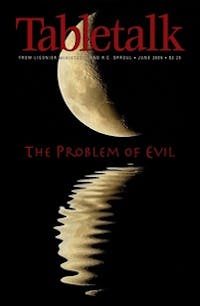
Request your free, three-month trial to Tabletalk magazine. You’ll receive the print issue monthly and gain immediate digital access to decades of archives. This trial is risk-free. No credit card required.
Try Tabletalk NowAlready receive Tabletalk magazine every month?
Verify your email address to gain unlimited access.
There is a great divide between the city of God and the city of man. The competing armies of the seed of the woman and the seed of the serpent, however, have this much in common — we’re all sinners. The defining quality of the gap may in fact be found in how we look at sin. If we were to poll those outside the kingdom of God on the question of evil, most of them would begin thinking through their pet answers to this common question: why do bad things happen to good people? That is, for the world, the problem of “evil” is more about the problem of human suffering. “Evil” is defined in their minds by things like Hurricanes Katrina and Wilma, or what we sometimes call “acts of God.”
Were the same polling to come before God’s people, we would see that we are hearing a different question. What puzzles us isn’t hurricanes and famines. We don’t wonder why bad things happen to good people because fundamental to our confession is this truth, that the only time a bad thing ever happened to a good person was when He volunteered for it. To us, the “problem of evil” isn’t destructive acts of God, but the primordial destructive act of man. The question is, how did good people do bad? How did Adam and Eve, created righteous and upright, come to rebel against their Maker? Once we have established that they have, there not only are no more good people, but there are no more bad things. Where there is pain, we who have been redeemed look to our faults. Those outside the camp point their fingers at God.
This explains perhaps why we tend to do better at weathering the storms. When sorrows like sea billows roll we may feel pain, but our universe isn’t turned upside down. We haven’t suddenly found ourselves inexplicably suffering at the cruel hand of the fates. Instead, we are at peace, for we know the promise of our God, that all things work together for God for those who love Him, who have been called according to His purpose. We know that for us, in short, that not only are there no good people, but there are no bad things. And we know that for them, even the bad things redound to the glory of our God.
When Katrina hit our shores, however, there was still room for debate, even within the kingdom. Given the well known, flamboyant sins for which New Orleans is known, some of us wanted to declare Katrina the clear judgment of God. Were it not for those casinos, were it not for the French Quarter, were it not for the parading of sexual perversion, these good folks reasoned, God would have spared the city. Other professing Christians took a different tack. The hurricane, some suggested, was the work of the devil, or his evil henchman, blind chance.
Whichever view we hold, however, we are still taking the world’s view. That is, in both cases, whether looking at the sins of the people of New Orleans, or looking at the hurricane itself, we overlook that which the event calls us to look to, our own sins. God may have been judging “those people.” He may also have been judging us. Were we wise we would not, like the mariners of Tarshish, react to judgment by looking for someone to blame, but would, like Jonah, confess, “Pick me up and hurl me into the sea; then the sea will quiet down for you, for I know it is because of me that this great tempest has come upon you” (Jonah 1:12).
The problem of evil, in short, is the problem of us. And the answer to the problem is the answer to every problem: repent and believe the Gospel. We who have done so, if we have learned anything, must have learned that we must continue to do so all the days of our lives. Martin Luther was right when he affirmed this as the first of his 95 theses: “When our Lord and Master, Jesus Christ, said ‘Repent,’ He called for the entire life of believers to be one of repentance.” We repent all our lives because repentance is life. But we do not stop there. We are to believe. We are to believe not only that if we confess our sins that He is faithful and just to forgive us our sins, but that He will indeed cleanse us from all unrighteousness (1 John 1:8–9). This is His promise. And it has the power to overcome all the evil in the world. The bottom line, then, is this. While every calamity that comes our way does indeed come from the hand of God (see Isa. 45:7), the problem of evil is our problem. And Jesus is the solution. As we trust in Him to rescue us from the wrath to come, so we trust in Him that what we experience in the here and now isn’t wrath at all. He merely wishes our dross to remove and our gold to refine. There too we find the answer to our evil. Suffering and hardship exist for His glory. Just like sin. He will be glorified in the judgment of the wicked, as well as the cleansing of the other wicked — we who have been called according to His purpose.
